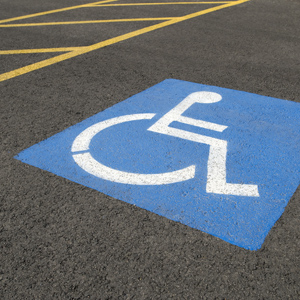Arizona AG asks for mass dismissal of multiple ADA cases; calls lawyer's tactics 'systemic abuse'

In a move that concerns some in the disability community, the Arizona attorney general’s office on Wednesday filed a motion to dismiss more than 1,000 cases focused on business parking lots, brought by a Phoenix lawyer on behalf of Advocates for American Disabled Individuals, LLC.
The lawyer, Peter Strojnik, has filed more than 2,000 disability access cases in less than a year on behalf of Advocates for American Disabled Individuals. The plaintiff reportedly had a standard settlement offer of $7,500, although under the Arizonans with Disabilities Act (AZDA), the financial penalty for a first offense is $5,000, according to the government’s motion (PDF), filed in Maricopa County Superior Court.
While some accuse Strojnik of abusing the system, attorneys who do access advocacy work note that the requirements in question are straightforward, and businesses could avoid getting sued by following the rules.
“[The attorney general’s office is] coming to the defense of the business owner. I recognize at least one name on the attorney general’s filing from its civil rights division. That’s concerning,” says J.J. Rico, executive director of the Arizona Center for Disability Law. The organization is the federally designated disability protection and advocacy group for Arizona.
“Folks routinely call about accessibility issues. It always surprises me why it’s not an incentive for businesses to naturally want to make their stores more accessible,” says Rico, who has never met Strojnik. Indeed, he’d never heard of the Phoenix lawyer or the Advocates for American Disabled Individuals—which was formed in January 2016 and in March issued a press release announcing that it had changed its name to the Advocates for Individuals with Disabilities—until ABC15 did an investigative series about Strojnik’s parking lot cases.
“I would like to meet them. If they are a disability advocates’ organization, we should be speaking to one another,” Rico says. “If they want to reach out to us, we’re easy to find.”
Advocates for Individuals with Disabilities has claimed that most of their cases settle for an average of $3,900, which is often cheaper than hiring an attorney, according to Arizona Attorney General Mark Brnovich’s office. When businesses did hire attorneys to file motions to dismiss, the plaintiff would dismiss the case after the motion was filed, the Aug. 24 filing states.
“And when plaintiff is removed to federal court, plaintiff often drops its federal claims and requests a remand,” the government wrote. “Many of the businesses that have not settled or fought back are at risk of default, and plaintiff recently filed what may be the first of many applications for default judgments.”
The government accuses Strojnik’s clients of bypassing the investigation process for alleged ADA violations, and “engaging in ‘trolling’ litigation tactics designed to induce defendants into quick pre-suit or post-complaint settlement that merely enriches the plaintiff.” The attorney general’s office took no position on whether the businesses were or were not in violation of ADA or AZDA standards.
“Plaintiff’s systemic abuse of the judicial system through these thousands of serial claims imperils the public interest by threatening the separation of powers established by the Arizona Constitution as well as the effective enforcement regime established by the public through the legislature,” the motion reads.
The state and federal government have shown no interest in enforcing the Americans with Disabilities Act, which is why Strojnik’s client is filing the cases, Strojnik wrote in an email to the ABA Journal. The most recent case brought by the AG’s office under the Arizonans with Disabilities Act was in January 2013, according to the AG’s website.
Strojnik describes his client as a charitable foundation, and says that over the past several months it has granted more than $85,000 to the community.
“The foundation is able to make these grants because, in part, I donate all my fees in support of the foundation’s charitable and enforcement activities,” Strojnik wrote. “I am unclear why the attorney general has become suddenly interested in participating in my client’s enforcement actions. I welcome its participation and intend to share with the attorney general the many violations which it must, by law, investigate and remedy. It is my hope that their actions will show that they are on the right side of history.”
There’s no notice period before filing a lawsuit under both Arizona and federal accessibility laws. The Americans With Disabilities Act does require that certain locations have specific amounts of accessible parking spots, and there’s regulation regarding the amount of space between spots, as well as signage size requirements. According to ABC15, some businesses Strojnik sued had signs that were a few inches too small.
In Strojnik’s cases, he sends an investigator to take pictures of the properties from a car, says Matthew T. Anderson, a Jarburg Wilk partner who represents various businesses sued by Strojnik. The lawyer first came to Anderson’s attention last year, in ADA cases Strojnik brought against hotels that did not have pools equipped with ADA-required built-in lifts. The plaintiff in those cases is Theresa Brooke.
“She would call the hotel and ask if they had it, she wouldn’t even go to the hotel,” Anderson says. “She claimed to be a guest, but I don’t know if that was verified.”
Over the past year Strojnik—or his son Peter Kristopher Strojnik—have brought at least 214 ADA cases on Brooke’s behalf, according to data provided to the ABA Journal by the federal court research service Pacer Pro. The cases were filed in California and Arizona.
“What I’d like to know is: Did the hotels get pool lifts after they were sued?” asks Rose Daly-Rooney, legal director for the Arizona Center for Disability Law.



